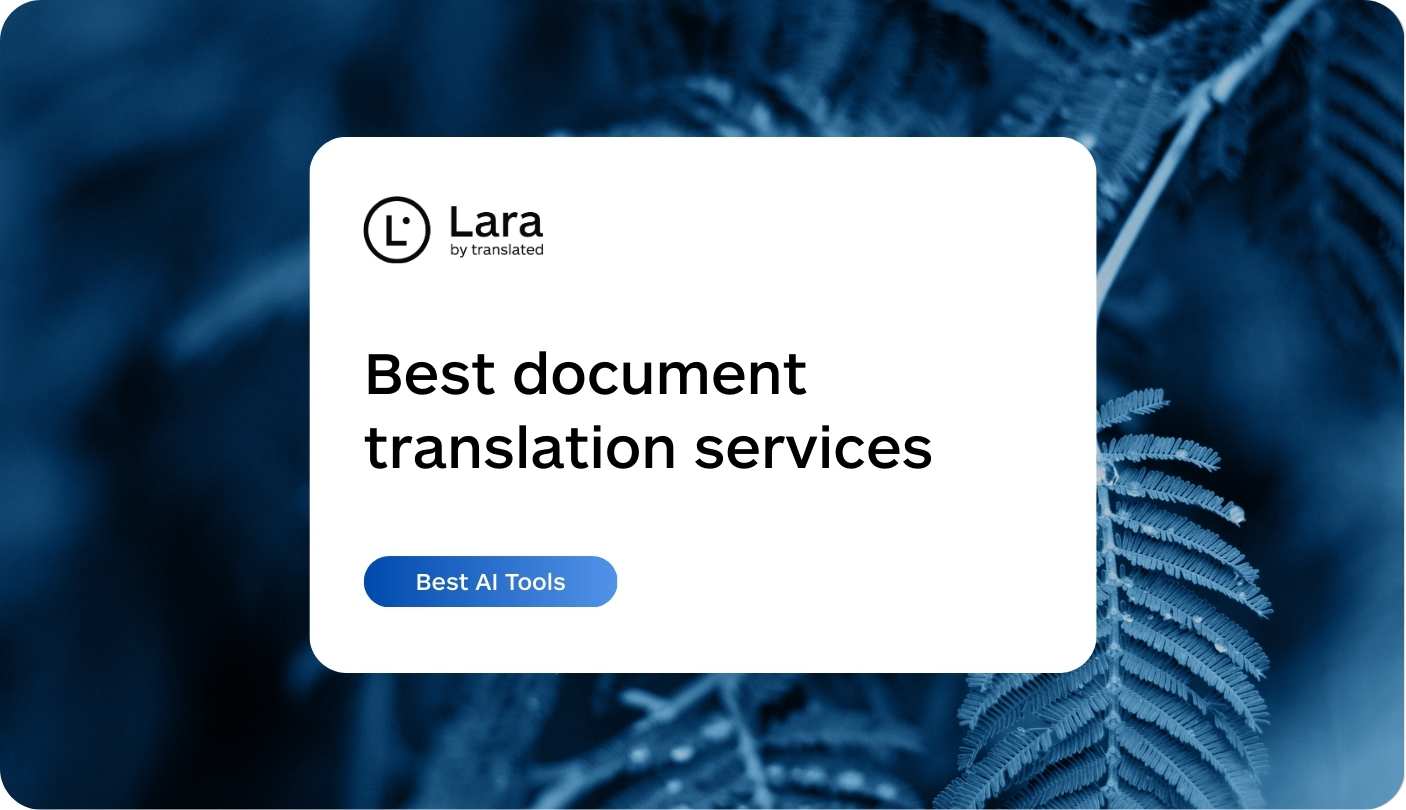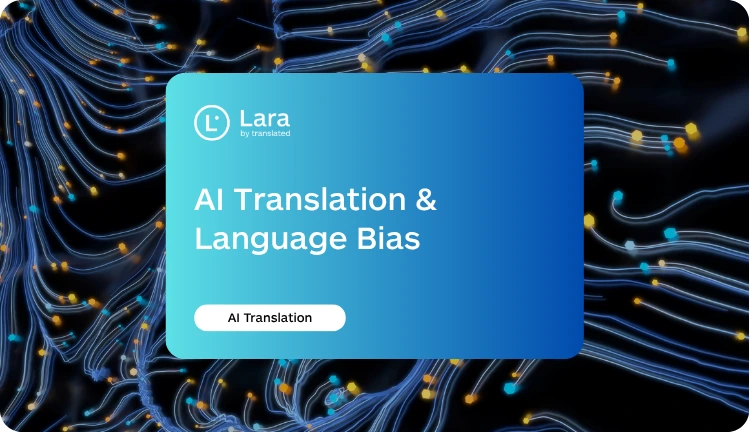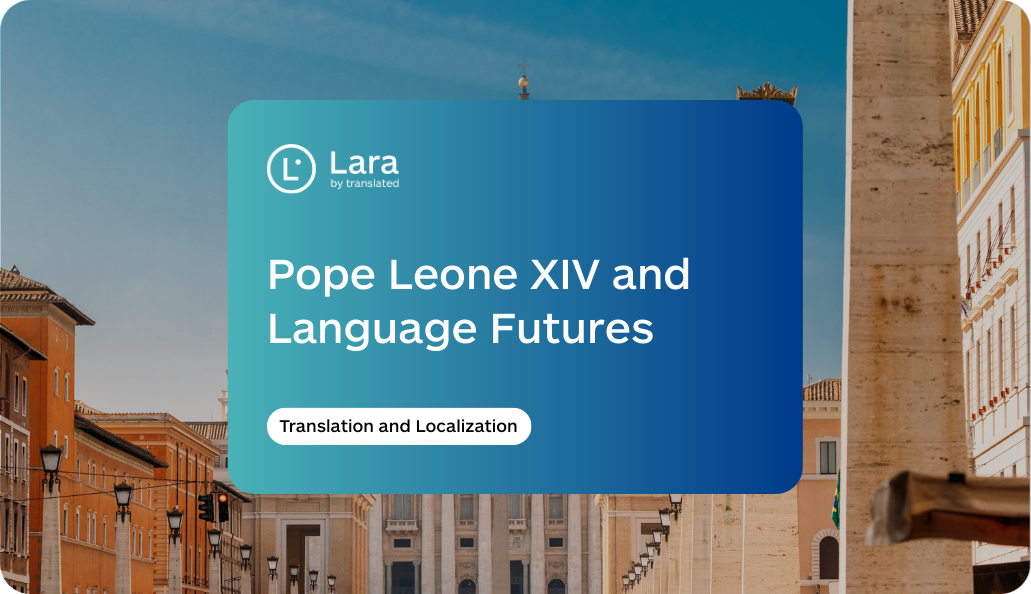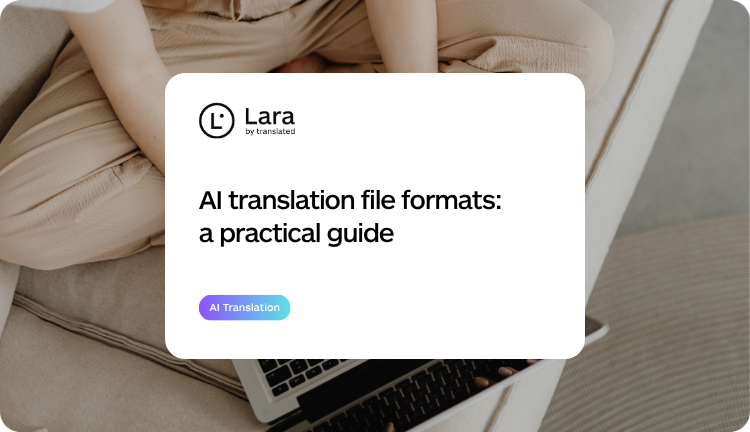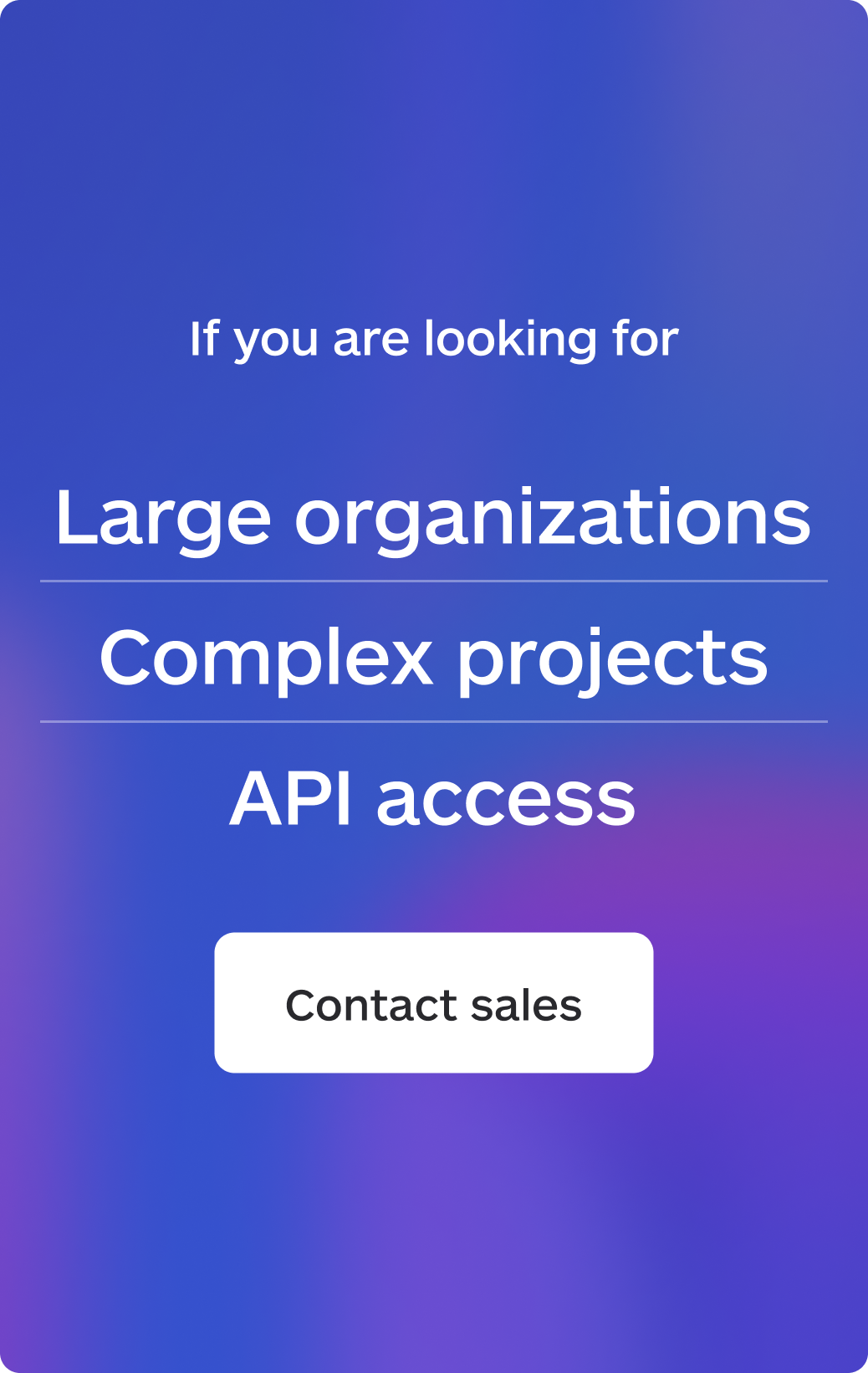Finding the best document translation services for your business needs has become increasingly critical in today’s global marketplace. Whether you’re dealing with legal contracts, technical documentation, or business correspondence, choosing the right translation provider can make the difference between successful international expansion and costly miscommunication.

Professional document translation goes far beyond simple language conversion. The top rated document translators understand that each document carries specific requirements for accuracy, cultural adaptation, and industry compliance. From legal briefs requiring certified translations to technical manuals demanding specialized terminology, the landscape of document translation services has evolved to meet diverse professional needs.
The challenge lies in navigating the numerous options available while ensuring you select a provider that combines cutting-edge technology with human expertise. Today’s professional document translation landscape features a mix of traditional agencies, technology-driven platforms, and hybrid solutions that leverage both artificial intelligence and human translators to deliver superior results.
Understanding professional document translation needs
Modern businesses require document translation companies that can handle everything from simple correspondence to complex regulatory submissions. The key is understanding that different document types demand different approaches. Legal documents need certified document translation providers who understand jurisdictional requirements, while marketing materials require transcreation services that preserve brand voice across cultures.
The evolution of translation technology has created new possibilities for speed and consistency, but the human element remains essential for quality assurance and cultural nuance. The most effective services combine AI-powered initial translations with skilled human post-editing, ensuring both efficiency and accuracy.
When evaluating providers, consider their track record with your specific document types. A language service provider specializing in financial documents may not be the best choice for medical translations, even if they offer competitive pricing. Industry expertise often trumps general capabilities when dealing with specialized content.
How to choose a document translation service
Selecting the right provider requires careful evaluation of several critical factors. Start by assessing their translation certifications and industry accreditations. Look for ISO certifications, particularly ISO 17100, which sets standards for translation services quality requirements.
Consider the provider’s approach to multilingual document handling. The best services offer comprehensive project management that tracks versions, maintains consistency across languages, and provides clear communication throughout the process. They should also demonstrate robust data security measures, especially when handling confidential business documents.
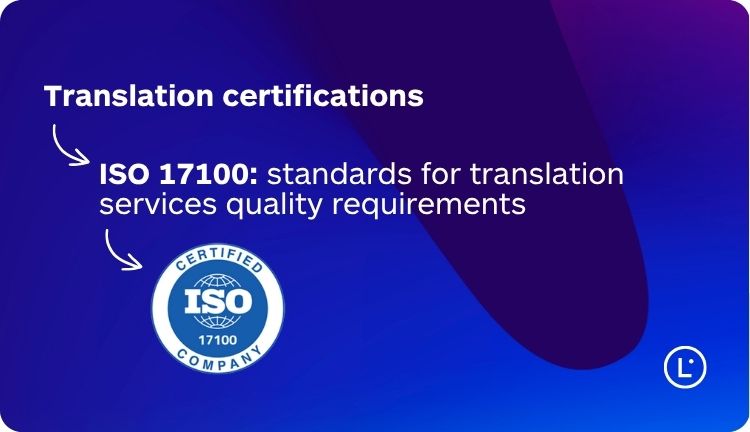
Evaluate their technology stack and workflow processes. Modern translation services should offer translation memory systems, terminology management, and quality assurance protocols. These tools ensure consistency across projects and can significantly reduce costs for ongoing translation needs.
Features to look for in a translation provider
When conducting a document translation service comparison, focus on these essential capabilities. First, examine their human resources – the quality of translators directly impacts output quality. Look for providers who work with native speakers who have subject matter expertise in your industry.
Technology integration represents another crucial factor. The best providers leverage Computer-Assisted Translation (CAT) tools, translation memories, and terminology databases to maintain consistency and reduce turnaround times. However, technology should enhance, not replace, human expertise.
Quality assurance processes distinguish superior providers from mediocre ones. Look for multi-step review processes that include linguistic review, cultural adaptation checks, and final proofreading by different linguists. The most reliable services also offer revision cycles and satisfaction guarantees.
Translation services for legal and technical docs
Specialized document translation for legal and technical content requires providers with deep industry knowledge. Legal translation demands understanding of different legal systems, terminology precision, and often requires certified translations for court submissions or regulatory compliance.
Technical documentation translation involves complex terminology, precise instructions, and often includes graphics or diagrams that need localization. The best providers for technical content offer desktop publishing services to ensure translated documents maintain their original formatting and visual appeal.
For both legal and technical translations, accuracy it’s mandatory. Errors can result in legal liability, safety issues, or regulatory non-compliance. Choose providers who guarantee their work and carry professional liability insurance.
Introducing Lara Translate’s advanced technology
Lara Translate represents a new generation of translation technology that addresses the limitations of traditional machine translation while preserving the essential human element. Built on advanced translation certifications and powered by sophisticated AI models specifically trained for business and professional contexts, Lara offers a unique approach to document translation.
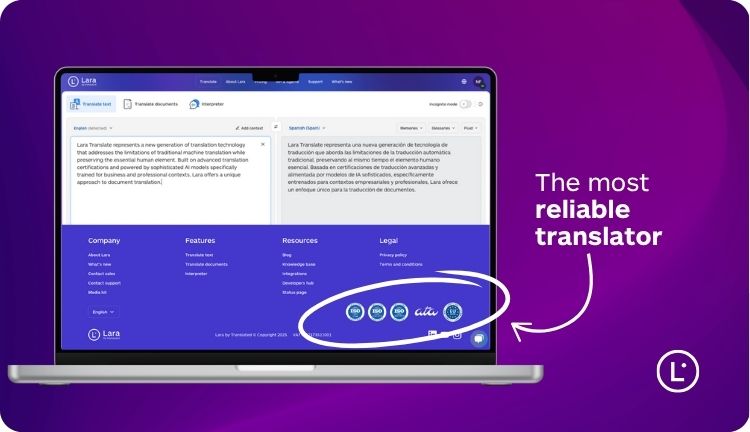
What sets Lara apart is its focus on contextual accuracy and domain-specific optimization. Unlike generic translation engines, Lara has been trained on professionally translated documents, ensuring higher accuracy for business communications. The platform supports multilingual document handling across many languages, with plans to expand more by the end of 2025.
The technology emphasizes speed without compromising quality, completing most translations in under 1.2 seconds while maintaining the nuanced understanding that business documents require. For organizations seeking reliable document translation options, Lara’s combination of AI efficiency and human-level accuracy provides a compelling solution for modern translation needs.
Translation agency ratings and market leaders
The translation industry features several established players, each with distinct strengths. Traditional agencies like Lionbridge and TransPerfect offer comprehensive services with global reach, making them suitable for large-scale enterprise projects. These translation agency ratings leaders typically excel in project management and can handle complex, multi-language initiatives.
Technology-focused providers like DeepL and Google Translate offer speed and convenience but may lack the specialized industry knowledge required for professional documents. Their strength lies in general content translation rather than specialized business applications.
Emerging platforms represent a middle ground, combining technological innovation with human expertise. These services often provide better value for businesses that need professional quality without enterprise-level complexity or pricing.
Reliable document translation options for different budgets
Budget considerations significantly impact provider selection, but the cheapest option rarely proves most cost-effective. When evaluating reliable document translation options, consider total cost of ownership, including potential revision costs, project management time, and the risk of errors requiring retranslation.
For occasional translation needs, pay-per-project services offer flexibility without ongoing commitments. Businesses with regular translation requirements often benefit from subscription-based services or volume discounts that reduce per-word costs while ensuring consistent quality.
Consider the hidden costs of poor translation legal liability, brand damage, or lost business opportunities that often exceed the savings from choosing low-cost providers. Invest in quality translation services as a business insurance policy rather than viewing it as a simple expense.
Quality assurance and certification standards
Professional translation services should adhere to established quality standards. ISO 17100 certification indicates that providers follow structured processes for project management, translator qualifications, and quality control. Certified document translation providers typically maintain these certifications to demonstrate their commitment to quality.

Look for providers who offer transparent quality metrics and revision policies. The best services track accuracy rates, client satisfaction scores, and turnaround time performance. They should also provide clear escalation paths for quality issues and satisfaction guarantees.
Certification requirements vary by document type and intended use. Court documents typically require sworn translations by certified translators, while business documents may only need professional translation with quality attestation. Understand your specific certification requirements before selecting a provider.
Future trends in document translation
The translation industry continues evolving rapidly, driven by advances in artificial intelligence and changing business needs. However, the human element remains irreplaceable for cultural nuance, creative adaptation, and quality assurance. The most successful future models will likely combine AI efficiency with human expertise rather than replacing one with the other.
Automation will likely handle routine document types, freeing human translators to focus on complex, creative, or highly specialized content. This evolution will likely result in better quality overall while reducing costs for standard translation tasks.
Integration with business systems will become increasingly important. Translation services that seamlessly connect with content management systems, customer relationship platforms, and document workflows will provide greater value than standalone solutions.
FAQs
What makes a document translation service professional?
Professional document translation services combine qualified human translators with robust quality assurance processes. They employ native speakers with subject matter expertise, use translation memory systems for consistency, and follow established quality standards like ISO 17100. Professional services also provide proper certification when required and maintain confidentiality protocols for sensitive documents.
How much do document translation services typically cost?
Document translation costs vary significantly based on language pair, document complexity, turnaround time, and certification requirements. Standard business documents typically range from $0.10 to $0.25 per word, while specialized technical or legal translations may cost $0.15 to $0.40 per word. Certified translations often include additional fees for notarization or sworn translator services.
What’s the difference between certified and standard translations?
Certified translations include a formal statement of accuracy from the translator or agency, often required for legal, academic, or official government purposes. Standard translations focus on accurate language conversion without formal certification. Certified translations typically cost more and take longer due to additional verification requirements and documentation processes.
How long does document translation typically take?
Translation turnaround times depend on document length, complexity, and certification requirements. Standard business documents (1,000-2,000 words) typically take 1-3 business days, while complex technical documents may require 5-7 days. Rush services are often available for 24-48 hour delivery at premium pricing. Certified translations may add 1-2 days for verification processes.
Can AI translation tools replace professional translation services?
While AI translation tools have improved significantly, they cannot fully replace professional human translators for business-critical documents. AI excels at basic language conversion but struggles with cultural nuance, industry-specific terminology, and complex formatting. The best approach combines AI efficiency with human expertise for optimal quality and cost-effectiveness.
This article is about
- Best document translation services that combine advanced technology with human expertise for professional results
- Professional document translation standards and quality assurance processes that ensure accuracy and reliability
- How to choose a document translation service based on industry expertise, technology integration, and security measures
- Translation services for legal and technical docs requiring specialized knowledge and certification compliance
- Document translation service comparison highlighting key features, pricing models, and quality standards
Have a valuable tool, resource, or insight that could enhance one of our articles? Submit your suggestion — we’ll be happy to review it and consider it for inclusion to enrich our content for our readers!
Useful articles
